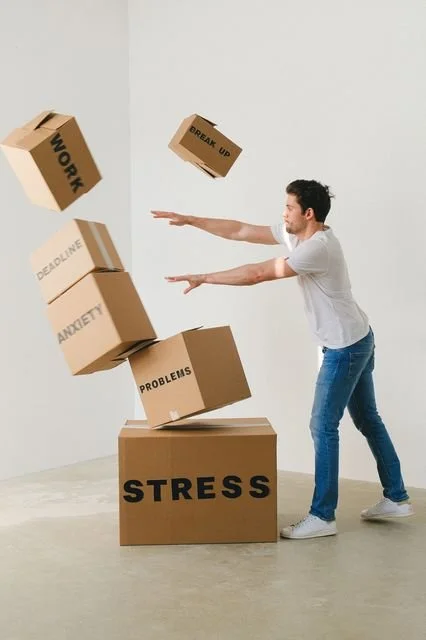Imagine a situation that can make you uncomfortable or anxious. Perhaps it is a presentation at work that is important to you and your company. It could be a speech you have to make in school or a class you must teach at church. Most likely, you don’t walk into that situation whistling a tune or planning your summer vacation. You are going over in your head the Power Point slides or the notes you have written down. You take a few deep breaths because you feel tension in your shoulders.
Congratulations…you are experiencing stress. But it is a good level of stress. Eustress is what one person calls it. It is a stress that keeps you alert and focused. It is a stress that can help you perform well in this anxiety-producing situation.
Imagine, again, the situation that makes you uncomfortable or anxious. This time the response is different. Your feel the tension in your shoulders while your mind is racing through the Power Point slides and wondering if you did a spell check on all of them. You feel your heart pounding and your hands sweating, while your mind tells that everyone will see how nervous you are if you don’t calm down. You have mental images of things not going well, while your mind tells you that you should have never volunteered to do this.
You are experiencing an unhelpful level of stress. Distress is what we call it. It is a stress that can be so overwhelming that your performance in the anxiety-producing situation doesn’t go well.
When your brain perceives a stimulus, your sympathetic nervous system goes to work. It releases a series of stress hormones.
Epinephrine dilates the bronchial tubes in the lungs. This allows more oxygen which, then, allows more blood to flow into the heart. The blood vessels leading away from the heart are restricted, so that the blood can flow freely to the brain and the muscles, which must be ready to flight or fight.
Norepinephrine constricts the veins leading to the heart so returning blood can enter and exit the chambers of the heart with greater force. It constricts the arteries leading to the skin; this will slow down bleeding if it occurs.
Finally, cortisol releases all the stored energy in your cells. This allows you to have the energy you need during the stressful situation.
Notice that all of this is happening in your body in response to a situation that you determine is a challenge or a threat. So what makes the difference between eustress and distress? There are a couple of factors.
The first factor is the nature of the challenge or threat.
Some life events would be highly stressful for anyone: The death of a loved one. A natural disaster. A cancer diagnosis. A serious accident. Some of these life events can go on for an extended period. The grief after a death. The rebuilding after a disaster. The recovery after a diagnosis or accident.
The second factor is perhaps the most important. It is how you interpret and respond to what is happening that can make the difference between eustress or distress.
Look again at the description above of the events that create distress. Something is happening in the body AND your mind is interpreting what is happening.
Mindfulness Stress-Based Reduction (MSBR) focuses on what is happening in both your body and your mind. You allow yourself to feel what is happening in your body. You are mindful of the physical responses to the release of hormones described above. But you are also mindful of the meanings and interpretations that your mind gives you about those responses.
This is important because the meaning you give to a situation can determine if the situation is a challenge or a threat. It can go two ways, and it can happen quickly. In one of the situations above, you notice your heart beating faster. Your mind tells you: You’re not ready. You can’t do this. You are going to fail. And your heart beats even faster. Or you can look at these thoughts instead of through them. You can notice and even accept these thoughts as thoughts, without getting caught up in them or trying to control them. This can give you more focus.
If you would like to know more about how MBSR can help you experience eustress instead of distress, please visit my stress reduction specialty page.



